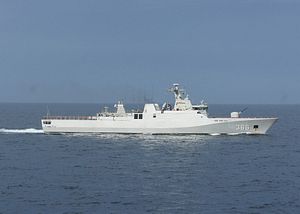Indonesia and Australia could soon move towards joint patrols in the South China Sea, Indonesia’s Defense Minister Ryamizard Ryacudu suggested Friday.
On Friday, following a meeting with Australia’s foreign and defense ministers, Ryamizard said he had proposed that the two countries conduct joint patrols in the eastern South China Sea in the near future to ensure safer waters.
“We have already suggested to Australia the possibility of conducting joint patrols in the eastern part of the South China Sea. We are sure that we will soon create a plan on how to realize it. They have more or less agreed,” he told reporters according to The Jakarta Post.
Few specifics were provided as to the nature of these patrols, which would be important in determining their significance. The Post noted that Australia’s foreign and defense ministers were unavailable for comment, as was the Indonesian foreign ministry’s director for Asia-Pacific and African affairs Desra Percaya. Desra was standing in for Indonesian Foreign Minister Retno Marsudi in her absence after the death of her father.
The comment was also made in addition to some other vague statements by Ryamizard that also raise more questions than answers. For example, he said that Indonesia had already proposed similar patrols with other ASEAN countries, such as Vietnam and Cambodia, and that Jakarta had already “coordinated and established commitments” on how to secure the South China Sea, with at least a third of the region – surrounding Thailand, Malaysia and Singapore – already being secured.
Though there have been conversations among Southeast Asian states about patrols in surrounding waters, Cambodia would be a curious choice in the case of the South China Sea given its obstructionism on that question (See: “Cambodia: A New Mediator Between China and ASEAN?“).
It is also unclear what, if anything, this means for Indonesia’s South China Sea approach. While Indonesia is not officially a claimant in the South China Sea disputes, Jakarta is an interested party because China’s nine-dash line overlaps with the exclusive economic zone (EEZ) around the resource-rich Natuna Islands. As I’ve written previously, Indonesia’s approach to the issue might be described as a “delicate equilibrium,” where it has sought to both engage actors diplomatically and emphasize the sanctity of regional institutions and international law (a softer edge) while also pursuing a range of security, legal and economic measures designed to protect its own interests (a harder edge) (See: “Indonesia’s South China Sea Policy: A Delicate Equilibrium”).
China’s assertive actions in the South China Sea in recent years – which included run-ins with Indonesian vessels – have made it difficult for Indonesia to maintain this ‘delicate equilibrium,’ and Jakarta has moved to recalibrate though not abandon it entirely. Indonesia been accelerating and publicizing its ongoing balancing initiatives more on the harder edge even though its engagement of China on the softer edge has not only endured but accelerated, with President Joko “Jokowi” Widodo seeing alignment between his own domestic economic goals for Indonesia and China’s regional ambitions.
It will be interesting to watch if anything comes of this arrangement between Indonesia and Australia and, if so, how it affects the broader South China Sea situation. Even though developments like these often grab the headlines and could indeed be operationalized, they exist alongside stubborn realities such as the capabilities of various actors, their longstanding policies, and the interests of those institutions that formulate them.
































